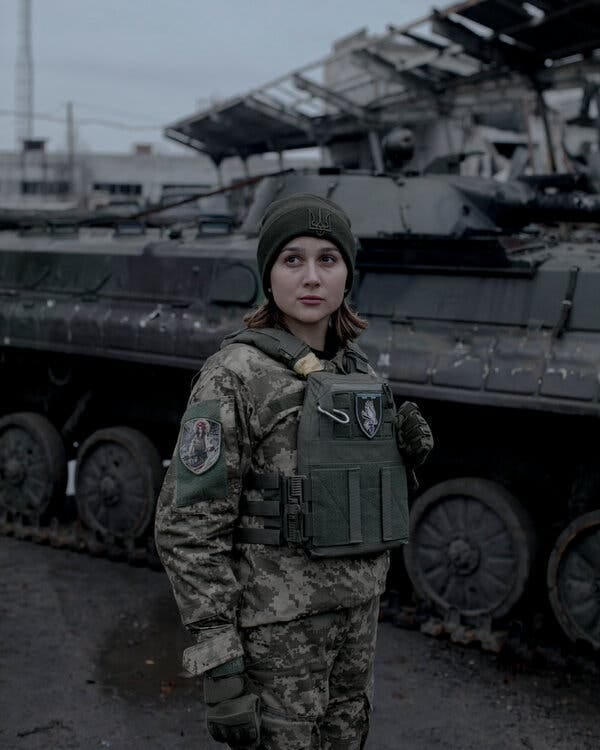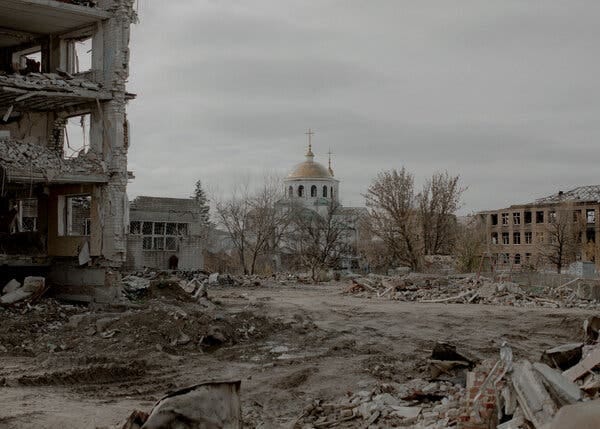If You Look Up The Definition Of "Courage," It Will Have A Picture Of Ukraine
These are not people who run from a fight when it's their homeland at stake
What animates Ukrainians, and should animate Americans and West Europeans, is the brutality with which Russia wages war…. There are long waiting lists for volunteers eager to serve in the Ukrainian military, and people pull strings to get called up sooner — a contrast to the hundreds of thousands of Russian men fleeing their country to avoid the draft.
I sometimes wonder how I’d react if my home were to come under attack. And not just my home, but my hometown and my home state. What if all of it was under attack by a hostile country that showed no mercy and gave no quarter as it attacked even targets with no military value- homes, apartment buildings, schools, hospitals, utility plants, and more?
How would I react as this enemy reduced everything around me to rubble and killed many of those I know and love? When the ability of my hometown to provide electricity and clean water had been reduced to almost nothing?
Would I seek to escape to safety with those close to me and those I could protect? Or would I stay and fight? Would I defend this place in whatever way I could and try to prevent this corner of the world that I’ve come to love from falling into the hands of those who’d grind us under their boot heel?
The truth is that I have no idea how I’d react. There’s no way to honestly know the answer to that question until it’s forced upon you. For now, though, there’s one place we can look to for inspiration and hope that if push ever came to shove, we could follow their example:
Ukraine.
Since last February 24th, Russia has rained literal Hell upon the people of Ukraine. Its Army has leveled whole villages and cities in a war that makes sense to virtually no one save for Russian President Vladimir Putin. Russian troops have committed unimaginable savagery, not just in combat but upon civilians as well. The number of war crimes investigated by Ukrainian and international authorities is estimated to be in the thousands. That number will only grow as the Ukrainian Army continues pushing Russians from Ukrainian soil.
Stymied on the battlefield, Russia is trying an alternative strategy: firing missiles to terrorize civilians and destroy the power grid and water supply. This targeting of civilians, a war crime, aims to inflict such brutal suffering on ordinary Ukrainians that they will want to cut a deal with Putin.
It isn’t working. Ukrainians aren’t wavering the way some Americans, French and Germans are….
What animates Ukrainians, and should animate Americans and West Europeans, is the brutality with which Russia wages war. There are lots of complicated issues in international relations, but this is stark: Russia has tried to annex part of a sovereign country and persistently commits crimes against humanity.
Most civilized nations long ago agreed to follow the internationally-recognized laws of war. Chief among those laws is the proscription from targeting civilians, civilian infrastructure, or anything of non-military value.
Of course, Russia has more often than not taken a brutalist approach to the conduct of war. If it lays waste to everything in its path, there will be nothing and no one left to resist it. The fact that there may well be nothing left standing is of no account to a Russian Army more than willing to destroy everything between it and total victory.
But “the brutality with which Russia wages war” is a significant issue, particularly since it invaded a sovereign nation with which it had no serious or credible conflict, merely one Vladimir Putin chose to invent.
(In Izium, recently liberated after months of Russian occupation, children have been injured by land mines, and mass graves and Russian torture chambers continue to be found.- NY Times)
Ukraine is the answer to the question I posed at the beginning of this piece. Of course, I’d also hope it would be the American answer, but I pray that we will never find ourselves in a place where we’d be required to answer that question.
For Ukrainians, though, this is their reality, the truth they must deal with daily. And they’ve confronted it head-on. From kids barely out of high school to senior citizens who barely have the strength to walk, millions are willing to sacrifice themselves in defense of their homeland. So many want to fight that Ukraine has a waiting list of people who want to fight for their country. Contrast that with the thousands of Russian men who’ve fled and continue to flee their homeland. They have no intention of fighting and possibly dying in a war that makes no sense to them.
Putin’s strategy in Ukraine seems an echo of his approach in Chechnya beginning in 1999 and in Syria in 2015: Inflict such pain on civilians that continued resistance is impossible. Oleksandr Filchakov, the chief prosecutor for the Kharkiv region, said his team is investigating 7,700 war crimes by Russians in the area, from executions to the targeting of schools. The liberation of Kherson in the last few days has led to similar reports of torture chambers uncovered there.
The atrocities provide a moral reason to support Ukraine, but there’s also a practical reason to do so. Many Americans and Europeans think that the West is doing Ukraine a favor by providing weaponry, but it’s actually Ukrainians who are offering themselves as a human shield in ways that benefit the West.
“Ukrainian resistance provides extraordinary security benefits to Americans,” noted Timothy Snyder, a Ukraine expert at Yale. “The least we can do is be on our own side.”
For years Americans and American military leaders feared the Russian military machine, thinking it to be among the best-equipped and most highly trained fighting forces in the world. The war in Ukraine has proven just how wrong that assessment has been. Most Russian troops in Ukraine are poorly-equipped, inadequately trained, and handicapped by low morale. Many Russian conscripts didn’t even know they were in Ukraine to fight until their transport doors opened and their commanders welcomed them to the war.
Russian planning and execution have been far below what the West had expected. Leadership in the field has been poor to nonexistent, and discipline has been well below what had been expected from an army feared by the West for so many years. In short, the Russian Army has proven to be a paper tiger. It’s certainly no pushover, but in the face of a well-trained, well-armed, and disciplined foe, Russian units have routinely crumbled and offered little resistance.
Why should they die when they don’t believe in whatever it is they’re fighting for? In most cases, they don’t even know what that cause is.
At this point, it seems only a matter of time before the Ukrainians succeed in ejecting the Russian Army from their territory. Where the Russians are poorly equipped for winter warfare, the Ukrainians are well-equipped, well-armed, and highly motivated. They also have sufficient armor to enable them to push into Russian lines. As a result, the Ukrainian Army may be able to gain ground during the winter, which isn’t usually a time that allows for conventional combat.
United States military planners have long worried about a Russian attack on Baltic countries in NATO. But at enormous cost in lives, Ukraine has so degraded Russia’s armed forces that the risk of that today is far lower.
Ukraine’s resistance may also increase the possibility that Putin himself will be toppled. That might lead to the rise of aggressive militarists who would be more likely to use nuclear weapons, but it could also moderate Russia and lead to a safer world while ending the dictatorship in neighboring Belarus and the division of Moldova and Georgia.
Predicting the fall of Putin is a dangerous business, if for no other reason than it involves reading tea leaves that few understand. It’s best to work with what’s known, and that’s the fact that Ukraine has dealt a severe blow to Russia’s armed forces.
Russia has suffered horrifically in terms of lives lost, and it’s running short on almost every category of war-fighting materiel imaginable. And since it’s become an international pariah, the only countries who will do business with it are other pariah countries like North Korea and Iran. How much longer Russia’s dwindling and aging arsenal will hold out is difficult to know, but there’s little doubt but that its armed forces are in dire need of resupply.
Ukraine has also suffered catastrophically, with perhaps as many as 150,000 lives lost if Pentagon estimates are to be believed. The advantages held by the Ukrainians are a seemingly never-ending supply of people willing to fight and a pipeline of modern high-tech weaponry coming from Western countries. As long as that pipeline holds up, the Ukrainians will maintain a distinct advantage.
[T[he bottom line is that we are all in debt to Ukrainians and we should continue to support David against Goliath. We can applaud Ukrainians for their courage and determination, which reminds me of English pluck during the Battle of Britain. (Ukrainians have the same thought: Gas stations sell biographies of Churchill.)
A simple slogan captures the dynamic: “If Russia stops fighting, there will be no war. If Ukraine stops fighting, there will be no more Ukraine.”
Russians have little incentive to continue fighting a war few support. Indeed, most Russians have no dog in this fight. On the other hand, Ukrainians ARE the dog in this conflict and are committed to pushing the Russian Army back to Mother Russia, including out of the Donbas and Crimea, where they’ve been since 2014.
The war in Ukraine has shown the West much about what the Russians are and aren’t capable of. We’ve learned that the Russian Army isn’t the formidable juggernaut we’d feared. Since the Cold War ended, the West has feared the Russian military as being something akin to a late-model Jaguar. Instead, the war in Ukraine has revealed it to be a ‘69 AMC Pacer with bald tires and no side-view mirrors.
Not that NATO and the West should become complacent about the Russians, who still have considerable nuclear capabilities, and it doesn’t take much of that to do a good deal of damage. But NATO now has a much better and more complete picture of Russian readiness and capabilities.
We should learn from Ukrainian resolve. In Kyiv, I met Senior Sgt. Dmytro Finashyn, 28, who was badly injured in fighting in May and separated from his unit.
For two days, he drifted in and out of consciousness, crawling toward his lines through a minefield when he was able, drinking from a swamp, wondering if he should cut off his mangled left arm. Ukrainian troops found him, half dead, and doctors amputated his left arm and a finger on his right hand. He is about to be fitted with a prosthetic arm — and then he plans to return to his battalion.
“We have our backs to the wall,” he told me. “We have no place to run. We can only go forward.”
Finashyn’s wife, Iryna, a banker, is not thrilled by his determination to return to war with an artificial arm. “I’m still working on her,” he acknowledged.
Russian airstrikes on Kyiv recently took out the family’s electricity and water supply; the Finashyns are among the 4.5 million Ukrainians who have lost reliable electricity. So she is coming around. She doesn’t want to lose her husband, but neither does she want to lose her country.
As Americans, the odds are excellent that we’ll never come close to facing the sort of crisis that Ukrainians have had to for the past nine months. We should be grateful for that, but we should never take that for granted. That’s why we should insist that our government continue to work with other Western governments to supply arms to the Ukrainians. Because the Ukrainian Army is doing the work many Americans feared we would have to do one day- fighting the Russians.
The Ukrainians have shown uncommon bravery in the face of an enemy who initially appeared to possess a seemingly overwhelming advantage. Their courage and toughness in the face of unimaginable suffering is something virtually none of us in this country will face in our lifetimes, and we should be thankful for that. Unfortunately, Ukraine has faced a brutal and cruel foe who has no respect for the laws of war and even less for the lives of innocent civilians.
For Vladmir Putin, atrocities and war crimes are matters of strategy, nothing more.
Despite this, Ukrainians have stood up and fought back. Moreover, those who haven’t been able to join the fight are helping in other ways. Almost every Ukrainian seems to be involved in the war effort in one way or another because that’s what it’s will take to drive the Russians from their land.
To do that, Ukraine will continue assistance from the West, and we must continue to be there for them. Every dime spent to degrade the Russian Army is a dime well spent because it brings Ukraine closer to restoring peace.
And it brings us closer to never having to answer the question of what we’d do in similar circumstances.








Excellent write up, wonderfully argued position. Ukraine is serving as a bulwark of democracy for the free world, just as you've stated. I understood back in February when the war started that Ukrainians, by defending their homeland, are in effect defending our homeland. They are experiencing an actual assault on their freedom as opposed to the rhetorical assault that we face here, which is why, besides out of a sense of basic decency to support those who are being unfairly attacked, it's so critical that we give Ukraine everything they need to sustain them; and do it expeditiously .